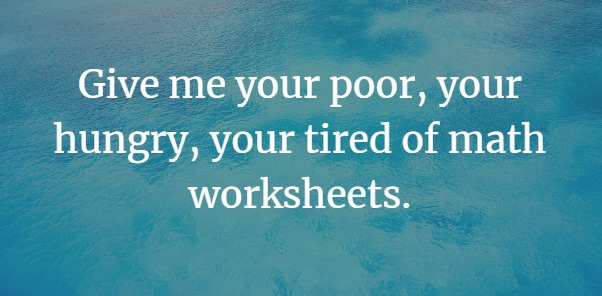2020 changed me. In short, I decided that to heal the world, we as adults need to be there for children. Not asking them to come to us if having a problem. Not putting them into therapy after things have gotten out of hand. We need to go to them. We need to be eyes and ears. We need to, by default, offer our presence.
I also, through my child development work, came to the conclusion that positive social interactions are critical to development. It’s not just having a buddy. Other humans are profoundly validating to a person. If you are having an issue and someone says “I have that issue too!”, it’s a game changer. If you think you see something but aren’t sure, and another person says they see it, too, it’s validating. Now think of all the brain development that happens at young ages. I am going to be arguing in my next book, Misbehavior is Growth: 4 Year Olds, that stable, secure relationships are essential for putting human consciousness itself into place.
Anyway, my point is, I want more community. I had thought about how to do this. Should I put out a call for a co-op? What should I call it? What would we do? Finally, pushed to the edge one day, more or less overwhelmed by pressure and guilt, I decided to just do something. After all of my overthinking, I just put a feeler out on a group one day, “Anyone want to meet for a math game?” Specific, off the cuff, incredibly genuine. Apparently, the answer from many was “yes!”
I’ve been running a math game meetup over the course of this summer. It’s gone pretty well! I have fairly big turnouts, depending on the week. My goal is to meet children where they are at. Whatever both their skill level and “vibe” is, I try to meet them. For a girl burying her face into her mom’s skirt, I drop on one knee and gently ask if she knows how to play Go Fish. For the older boy so over any “boring” activity I show him (like Go Fish), I get out a highly strategic, competitive game. I’ve had moms bubble about their “shy” child, “She just sat down and played! And the next thing I knew, she was playing another game!” Or the child who “hates math,” start to slowly smile and tell me, “Blackjack… I like Blackjack!” I have many stories like this and now several notes about how much fun people had. Here are some of my pointers for starting such a club and how to run it.
Be specific about what you will do when you ask people to come join
When I put out the feeler for if anyone wanted to play math games, I was specific. I described a few games we might play. “Maybe we could play Galactic Conquest where there is a grid and we roll two dice and shade in an area with that rectangle.” And some other games. I found people went, “Hmmrph. I’ve never heard of THAT before. But it sounds interesting. Show me more.”
Pretend the party has already started
I learned this from reading a book about how to start a video blog. The author describes getting people excited by treating it as if there is a party on a train and the train is taking off. You coming?
When the momentum got going, it stayed going. Once, I held a meetup on a Friday. Many people showed up. As they left, they said, “See you next Friday!” I had not many any plans for a meetup next Friday. I guess it’s what we’re doing!
Assure people math games are for them
I found many people thought their children “weren’t good at math” and wouldn’t do well at a meetup. So, that’s the prejudice and the inherent rock and hard place that makes healing/joining difficult. Math games are perfect for struggling learners. And yet they see it as this challenging, intimidating thing where they will be judged and feel lonely and stupid. People had many specific questions and I would answer, “Even if they don’t like math games, we can play traditional, fun games like Rummy.” Just about all of them with hesitancy ended up coming–and many kept coming *back*.
I used to recommend that people try math games or read books. It usually goes nowhere. But it’s a game changer when you say, “I hold a math game meetup. Want to come?” You are willing to pull up a chair and be there with them. It’s not school. It’s a party.
Create the space, hold the space
Can I confess something? I am always on the verge of quitting things. I am highly sensitive. I get super upset over judgmental comments. At my first meetup, I felt super judged. So, the first meetup is unlikely to go super spectacularly. It’s your first one. I was super nervous. Kids who aren’t my own. Games I weren’t sure would be a hit. And I got what felt like the “snuff” treatment. Who are you? Are you a teacher? What is your math credentials? Ok, like literally none. I mean, I have an Industrial Engineering degree and I’m a homeschool mom and a completely educational junkie and everything. But if you’re looking for someone born from the brow of Jupiter already perfectly functioning, I’m not it. My ace up my sleeve is I put a smile on children’s faces. Like Mary Poppins, most adults think I’m completely nuts, whimsical, and too soft. And yet I consistently get children playing and smiling. It’s all I have. That’s it. The fact that your child stepped up, played a game, and felt happy and confident.
I have this motto, “create the space, hold the space.” Looking back on all success I’ve had, it’s pretty undeniable that this helps. Push through the negative comments, etc. I was committed to holding a math game meetup once per week. It ended up working out. Not everyone could make the first week. Their kids had summer camp, etc. They also weren’t sure it was for them. But as I kept posting about it and showing what we did, some went, “Ok, yeah, I could maybe do that.” And they came: new people, new weeks, new games, with me getting experience each time. It’s a fact of human nature that we have to experience things together until things become functioning.
Make a commitment. Every week for 8 weeks. Or whatever.
Explain the games
It sounds obvious, but things can go awry. Explain what a game might be and ask who might want to play it. I sometimes just started playing a game with a child, and it was a total dud or not what they thought, and now you’re sort of stuck in the middle of a game you don’t want to play.
It’s not a bad idea to print the instructions of some games you might consider playing that week. I limited myself to 3-4 per week, per sets of children. So I would bring 3-4 games for preteens; 3-4 games for 6-9 year olds, etc.
I found most games do best with 2-4 players. If each player has to think before taking their turn, say when playing Rummy, if there are 5 or more people, the game takes way too long. Kids can’t wait for 4 other people. I was shy to have games that were exclusive like this: where only 2-4 people could play. I got over it. I would set up 2-4 kids and then try to set up the next 2-4.
Learn some games, then pay attention
I learned most of the math games I played from Denise Gaskins’ series, “Math You Can Play.” I also brought some games like Connect 4 or checkers. I then watched to see how the kids did. Here are some of my observations:
For little kids (3-5), open-ended play and hopping games are a hit. Gaskins has hopping games you can play in her Counting book. Open-ended play is great for this age. Simply playing with a Connect 4 grid can work. They MIGHT be able to play a game like Go Fish. Kids like matching games.
For aged 6-9, they like a mix of both easy games and some games with strategy. A simple game where 9 cards are laid out and they have to find two cards that add up to 10 is surprisingly fun for them. Almost no strategy at all. They are just adding. They also LOVE to play War. It exercises their brain without any pressure. They seem to like it. They can also be pushed further than most think. They can play a game like Target 10. In this, you lay out 5 cards or roll 5 dice and they have to think of ways to add up to 10 or whatever the target number is. A game like Math Dice Jr., does this. I find parents somewhat like having a “real” game. It seems more official to them. At least the dice are less likely to blow away in the wind.
For older kids, 11+ especially, you have to challenge them. I find they loved a “crack the code” game. Assign a number to the letters A, B, C, D. Each player does this. You can ask each other a question on your turn. “Is A bigger than 7?” It captivated children, easily, and they can play for well over an hour. I am surprised at how much they like games involving a Hundred Chart. For kids who “hate math,” games like Rummy or Snuggle Number can be a hit. I find children who “hate math” are often more intuitive types whose imagination need captured before they play. Why play such OBVIOUS games where you just bounce around on a number line? That’s how an intuitive thinks. They need several possibilities to pick from, none of which are obviously right, to keep their attention.
Spice it up?
I had an idea to rent out a party room at a restaurant and have a themed event. Maybe we pretend we are at an English Pub and play games played in an English Pub like “Shut the Box.” Or maybe we pretend we are going to Vegas, dress up, and play games like Blackjack. I haven’t tried this yet. I worry parents will see this as “bad” or whatever. But I’ll say this: the kids would undoubtedly like it.
Wouldn’t it be fun? More math game meetups? Maybe different groups meet in different towns and we come together for tournaments on occasion?
At any rate, it’s quick and effective at getting people together, getting children to make friends quickly, and infusing them with joy, confidence, and a math skill or two here or there.

Amber documents the age-related “stages” children go through. She firmly believes the best way to handle children is to observe them and respond sensitively to what their emotional cues are telling us. Her book series is Misbehavior is Growth. Send your friends and family to The Observant Mom!


